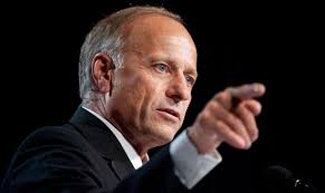For many years many academics and writers had avoided using the term racism or, more precisely, had avoided calling people racists because many believed that such terms had lost their meaning and power due to overuse. However, with the rise of this administration, the topic and its accompanying discussion has been invoked once again.
 Rep. Steve King (R-Iowa) recently said that “we can’t restore our civilization with somebody else’s babies.”
Rep. Steve King (R-Iowa) recently said that “we can’t restore our civilization with somebody else’s babies.”And once again observers are invoking the notion that the term or terms have become, or are, meaningless, at a time when those associated with such behaviors, at least in their own minds, have inoculated themselves against such charges.
It is not so much that that there has been an overuse of these terms, but rather, that a generational pushback, beyond speaking in code, led by the extreme right-wing, has been successful. As a result, it points to the need to be more precise. Invoking the concept of racial supremacy or White racial supremacy, akin to Eugene Robinson of the Washington Post, is more accurate and precise. At the same time, it is also time to better diagnose and describe such behavior, as opposed to simply labeling it or people as such.
Part of this highly sophisticated pushback has including embracing the above terms publicly, which subsequently and in effect, nowadays, functions as a shield.
Indeed, what happens when such words or even concepts lose their meaning? For example, how does one counter the idea that the U.S. president simply has an alternative way of looking at the world, that he simply has a conservative outlook? In this case the media has given him a huge pass by attributing his misogynist, xenophobic and racially extreme views to his underlings such as Steven Miller and Stephen Bannon, who formerly headed Breitbart News.
The reality is that this discussion is even much deeper because that which the president espouses is even more denigrating then that described above. And secondly, what we are seeing is not so much the president receiving a pass, but his adherents also receiving that pass.
So let us return to examine precisely what the president says he believes, and it is important to understand that his views are not new or unique. They come directly from the 1400s and the 1500s, at least relative to this continent. They are related to the concepts of providence and manifest destiny. At work is a religious idea that the Indigenous peoples from this continent were less than human. The same idea also applied to Blacks or African peoples. Today we refer more generally to people of color, who continue to be viewed as both less the human and in the way of so-called civilization. Of course, Iowa Rep. Steve King recently invoked this civilizational clash idea, warning of non-White babies being unable to replenish the values of the United States.
In this sense, that is what the president invokes when he conjures up the notion of “make America great again:” a time when it was publicly permissible to invoke that people of color were less than human. Peoples we associate with such views were the conquistadors, the “explorers,” the slave masters, and the priests that came with them that justified that genocide, land theft, slavery and plunder and their codified segregation and discrimination. It was the priests that legitimated that dehumanization, the dehumanization that is with us to this day and which is completely evident in the policies of the current president. These are the same policies that we saw in Andrew Jackson, both a slave owner but also and Indian killer (It is no coincidence that the president recently placed a wreath on his tomb in Tennessee, that his portrait now is prominently displaced in the White House and that he will not be removed from the $20 bill). Most recently, in the popular imagination these are views that are publicly espoused by the likes of David Duke and the KKK.
And yet, what has been most revealing is not so much the president’s views, but that of his adherents. Many of his critics appear to take comfort in the knowledge that a majority of the voters did not actually vote for the current president. And yet one can argue that indeed there is a large segment of the population (from the hate radio universe) that while they may not have voted for him, they probably agree with his views. The internet is 2.0 of what had been on those radio waves for a generation. And now, they have been given the green light to publicly display those views. The recent posting of “America is a White Nation” fliers at the University of Maryland is an example of that hate unleashed. And of course, hate crimes and hate groups are today also on the rise.
It is evident that this is beyond labels. This is beyond who is racist and beyond who is a legitimate American. What is at stake here is beyond the president’s views. It is about who is considered human (with accompanying full human rights), who decides, and who defines what it means to be a human being. Indeed, it is about competing sentiments and ideologies: dehumanization v. humanization or rehumanization.
Dr. Roberto Rodriguez is an associate professor in Mexican American studies at the University of Arizona.















